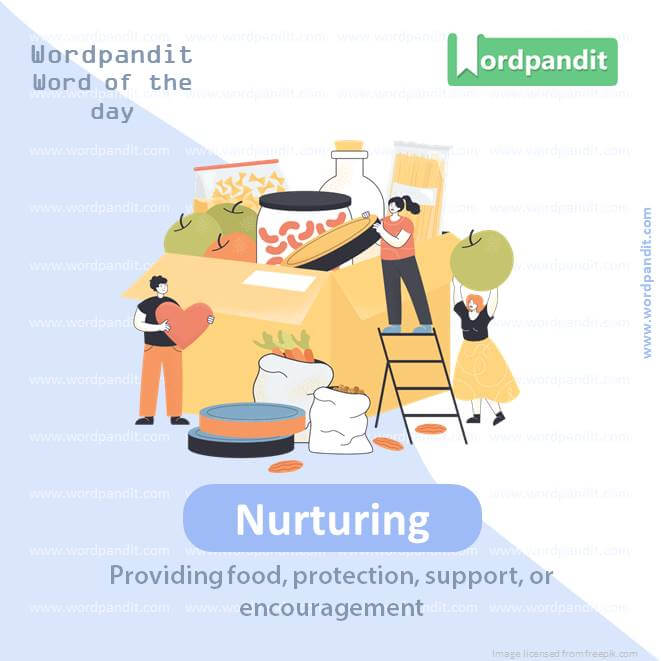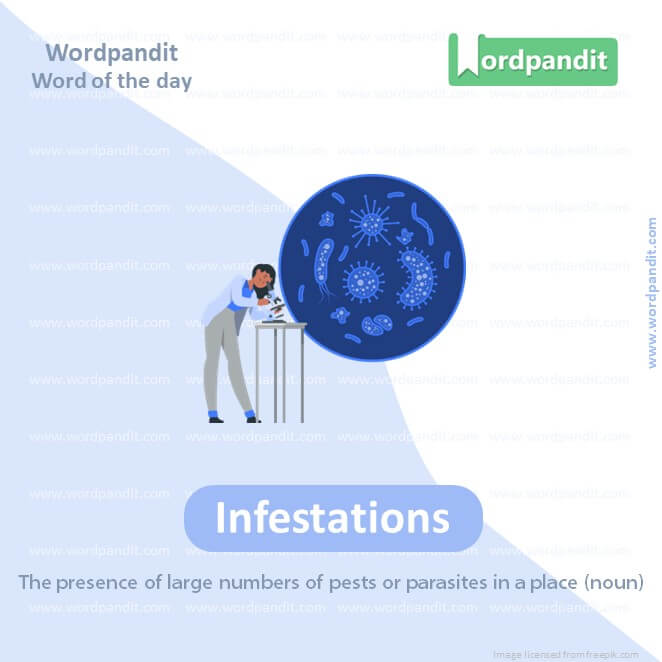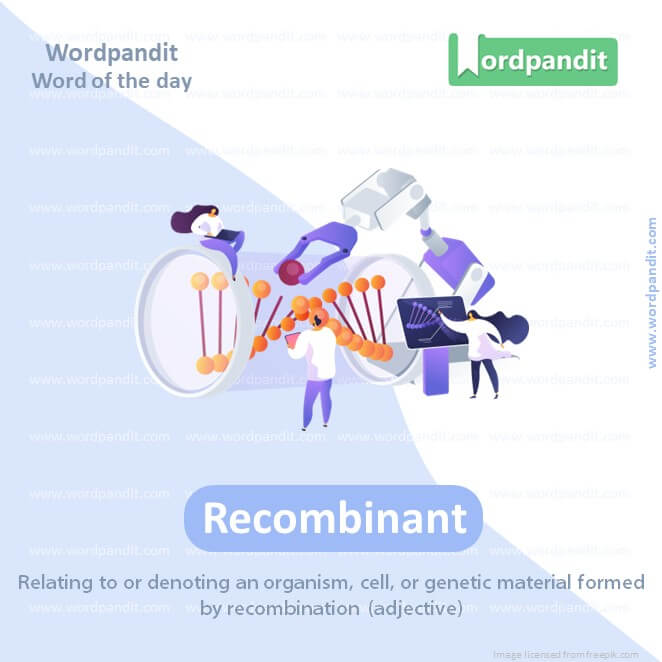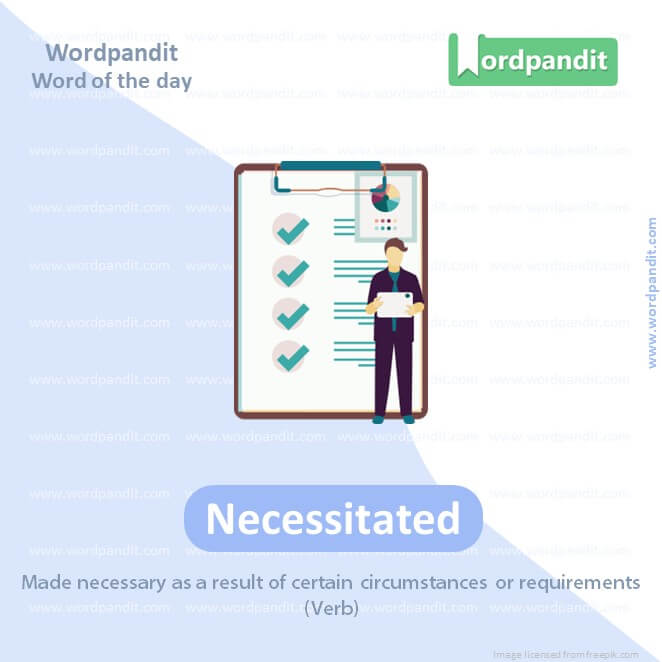Daily Vocabulary Words: List of Daily Used Words in Leading Indian Newspapers
Hi there. Welcome to this special section @ Wordpandit. Our endeavour here is straightforward: highlighting daily vocabulary words that you would come across in leading newspapers in the country. We have included the following newspapers in our selection:
• The Times of India
• The Economic Times
• Hindustan Times
• Mint
• Indian Express
We are putting in extensive work to develop your vocabulary. All you have to do is be regular with this section and check out this post daily. This is your repository of commonly used words; essentially, we are posting a list of daily used words. Hence, this has significant practical application as it teaches you words that are commonly used in leading publications mentioned above.
Visit the website daily to learn words from leading Indian newspapers.

WORD-1: Nurturing
CONTEXT: It only seems appropriate to acknowledge and celebrate the role of Manju Sharma in nurturing and expanding the biological-sciences research in India.
SOURCE: Hindustan Times
EXPLANATORY PARAGRAPH: Think of when you’re learning to ride a bike, and someone holds onto the back of the bike to keep you from falling. They’re helping you, encouraging you, and making sure you’re okay as you learn. That’s called “nurturing.” It’s when someone helps and takes care of you, making you feel loved and supported.
MEANING: Providing food, protection, support, or encouragement (verb)
PRONUNCIATION: NUHR-chuhr-ing
SYNONYMS: caring, supporting, fostering, cultivating, encouraging
USAGE EXAMPLES:
1. Her nurturing approach helped the shy student become more confident.
2. The nurturing environment at home made learning fun for the kids.
3. A garden requires nurturing to flourish.
4. Teachers play a nurturing role in the development of students’ abilities.

WORD-2: Infestation
CONTEXT: Cotton production in India was traditionally challenged by bollworm infestation.
SOURCE: Hindustan Times
EXPLANATORY PARAGRAPH: Imagine if lots and lots of tiny bugs decided to make your room their home, crawling everywhere and making it hard for you to play. That’s called an “infestation.” It’s when too many unwanted creatures gather in one place, making it a problem.
MEANING: The presence of large numbers of pests or parasites in a place (noun)
PRONUNCIATION: in-fes-TAY-shun
SYNONYMS: invasion, plague, swarm, outbreak, proliferation
USAGE EXAMPLES:
1. The infestation of ants in the kitchen required immediate attention.
2. A rat infestation can be a serious health hazard.
3. They called pest control to deal with the termite infestation.
4. The garden was suffering from an infestation of aphids.
WORD-3: Tirelessly
CONTEXT: The department of biotechnology (DBT) played a crucial role in introducing Bt cotton by facilitating the import of GM seeds, undertaking field trials and working tirelessly to obtain regulatory approvals.
SOURCE: Hindustan Times
EXPLANATORY PARAGRAPH: Think of your favorite superhero who keeps saving the day, never stopping for a break, always ready to help more. That’s being “tirelessly.” It means working really hard without getting tired or giving up, just like how heroes do.
MEANING: Working with a lot of energy and effort without getting tired or stopping (adverb).
PRONUNCIATION: TYRE-lus-lee
SYNONYMS: relentlessly, indefatigably, unflaggingly, ceaselessly, persistently
USAGE EXAMPLES:
1. She worked tirelessly to finish her project on time.
2. Volunteers tirelessly helped the community after the storm.
3. He tirelessly pursued his dream of becoming a doctor.
4. The team worked tirelessly to meet the deadline.

WORD-4: Recombinant
CONTEXT: The same year (2002) also saw the development and introduction of the low-cost recombinant hepatitis B vaccine by Shantha Biotech.
SOURCE: Hindustan Times
EXPLANATORY PARAGRAPH: Imagine taking a piece of a LEGO structure from one set and attaching it to another set to make something new and cool. That’s a bit like “recombinant.” It’s a science term that means taking parts of DNA (the stuff that tells our bodies how to grow) from different sources and putting them together to create something new.
MEANING: Relating to or denoting an organism, cell, or genetic material formed by recombination (adjective).
PRONUNCIATION: ree-KOM-bi-nant
SYNONYMS: genetically engineered, modified, hybrid, spliced, fused
USAGE EXAMPLES:
1. Recombinant DNA technology has led to major advances in medicine.
2. They used recombinant proteins for the new vaccine.
3. The study focuses on recombinant gene expression.
4. Recombinant enzymes are used in many industrial processes.
WORD-5: Sequencing
CONTEXT: the present sequencing infra, capacity, expertise, and the consequent success of the Indian SARS-CoV-2 Genomics Consortium (INSACOG).
SOURCE: Hindustan Times
EXPLANATORY PARAGRAPH: Imagine you have a bunch of pictures from a trip and you’re trying to put them in order from the first day to the last day. That’s like “sequencing.” It’s when you arrange things in a specific order, like the steps in a story or pieces in a puzzle, so everything makes sense.
MEANING: The process of determining the precise order of something, often used in reference to the order of nucleotides in DNA or RNA (noun).
PRONUNCIATION: SEE-kwens-ing
SYNONYMS: ordering, arrangement, organization, layout, configuration
USAGE EXAMPLES:
1. DNA sequencing helps scientists understand genetic information.
2. The sequencing of events was crucial to solving the mystery.
3. They used next-generation sequencing for the research.
4. Sequencing the chapters helped the author improve the story flow.

WORD-6: Necessitated
CONTEXT: who were worried more about the career break in the resume necessitated by motherhood (two years), and less about general awareness or analytical skills.
SOURCE: Hindustan Times
EXPLANATORY PARAGRAPH: Imagine you want to make a big sandcastle, but you find out the sand is too dry. You need water to make the sand stick together. That means the water is “necessitated” or really needed for your sandcastle. It’s when something is so important that you must have it to do something else.
MEANING: Made necessary as a result of certain circumstances or requirements (Verb)
PRONUNCIATION: neh-SESS-i-tay-ted
SYNONYMS: required, demanded, compelled, called for, mandated
USAGE EXAMPLES:
1. The breakdown of the machine necessitated urgent repairs.
2. The severe weather necessitated a change in our plans.
3. The complexity of the project necessitated a team effort.
4. His condition necessitated immediate medical attention.
WORD-7: Commencing
CONTEXT: On OPAs, and on commencing a dialogue in the WTO on trade and industrial policy and trade and environment, it is time for India to consider the need for change.
SOURCE: Hindustan Times
EXPLANATORY PARAGRAPH: Imagine you’re at the start line of a race, and everyone’s waiting to start running. When the whistle blows, the race “commences” or begins. It’s just a fancy way of saying something is starting, like a game, a movie, or even your birthday party.
MEANING: Beginning or starting (verb).
PRONUNCIATION: kuh-MENS-ing
SYNONYMS: starting, beginning, initiating, launching, opening
USAGE EXAMPLES:
1. The ceremony will be commencing at noon.
2. Commencing the project requires all materials to be prepared.
3. The meeting is commencing with a brief overview of the agenda.
4. She is commencing her studies at the university this fall.
WORD-8: Computation
CONTEXT: Market price support is one of the product-specific measures that go into the computation of the AMS.
SOURCE: Hindustan Times
EXPLANATORY PARAGRAPH: Think about when you’re using building blocks to figure out how many you need to make a tower. You’re counting and calculating to get the right number. That’s like “computation.” It’s a way of saying we’re solving problems or figuring things out, usually with numbers or computers.
MEANING: The process of calculating or computing something (noun).
PRONUNCIATION: kom-pyoo-TAY-shun
SYNONYMS: calculation, computing, processing, reckoning, figuring
USAGE EXAMPLES:
1. The computation of the final score took some time.
2. Advanced computations are required for space travel.
3. The computer can perform the computation in seconds.
4. They used statistical computation to analyze the data.

WORD-9: Envisaged
CONTEXT: the Indian minister seems to have been equally incensed by the fact that the proposed Fisheries Agreement envisaged that the top fishing nations would only be obliged to demonstrate that they have implemented measures for maintaining the fishery stocks at a biologically sustainable level.
SOURCE: Hindustan Times
EXPLANATORY PARAGRAPH: Imagine you’re dreaming of the perfect playground with slides, swings, and everything you love. You’re “envisaging” it, or picturing it in your mind exactly how you want it to be. It’s like imagining or planning something in your head before it happens.
MEANING: Thought of or imagined something as a future possibility (verb)
PRONUNCIATION: en-VIZH-uhjd
SYNONYMS: envisioned, imagined, pictured, conceived, visualized
USAGE EXAMPLES:
1. She envisaged a new type of community center for the neighborhood.
2. The plan envisaged significant changes to the building.
3. He had always envisaged a career in music.
4. The project was envisaged to take three years to complete.
WORD-10: Unrestrained
CONTEXT: The minister was particularly concerned about the possible unrestrained use of non-specific fuel subsidies.
SOURCE: Hindustan Times
EXPLANATORY PARAGRAPH: Think of playing in a huge, open field where you can run anywhere you want, with no fences to stop you. That’s being “unrestrained.” It means there’s nothing holding you back or stopping you; you’re free to do what you want, like shouting loud or running fast.
MEANING: Not held back or controlled; free (adjective).
PRONUNCIATION: un-ri-STRAIND
SYNONYMS: uncontrolled, unchecked, unrestricted, unbounded, limitless
USAGE EXAMPLES:
1. The child’s joy was unrestrained when she saw the puppy.
2. He expressed his opinions in an unrestrained manner.
3. The party was filled with unrestrained laughter and fun.
4. Her creativity was unrestrained, leading to innovative designs.
Vocabulary Words in English
In the kaleidoscopic world of language, the thread of ‘vocabulary words in English’ weaves a rich tapestry. These words, the building blocks of communication, lend themselves to the eloquence and effectiveness of our speech and writing. Despite their significance, mastering ‘vocabulary words in English’ can sometimes be daunting, but with strategic approach, the process can be greatly simplified.
Learning ‘vocabulary words in English’ goes far beyond rote memorization. It requires an integrated approach that encompasses understanding and using the words. Consuming a diverse range of English materials such as novels, news articles, movies, music, and online content can acquaint you with words in actual use, helping you perceive both their meaning and usage in different contexts.
Furthermore, incorporating memory-enhancing techniques can add impactful strides to your journey of mastering ‘vocabulary words in English’. Methods such as the Leitner System or flashcards can bolster the memory retention of these words. Meanwhile, using mnemonic devices, associating words with unique stories or images, can help in retaining the ‘vocabulary words in English’ in long-term memory.
Another key to deciphering ‘vocabulary words in English’ is by practicing them in real-world contexts. Incorporate the new words into your daily conversations, written emails, or social media posts. Not only will this reinforce the meanings and applications, but also boost your confidence in using them.
In essence, understanding ‘vocabulary words in English’ is a continual journey that calls for persistent commitment, diverse learning approach, and ample practice. As you indulge in this exploration, you will find your command over the ‘vocabulary words in English’ becoming stronger, leading to more confident and dynamic communication. Remember – in the world of language, words are your faithful companions, and the more you engage with them, the more they’ll reveal their richness to you.













